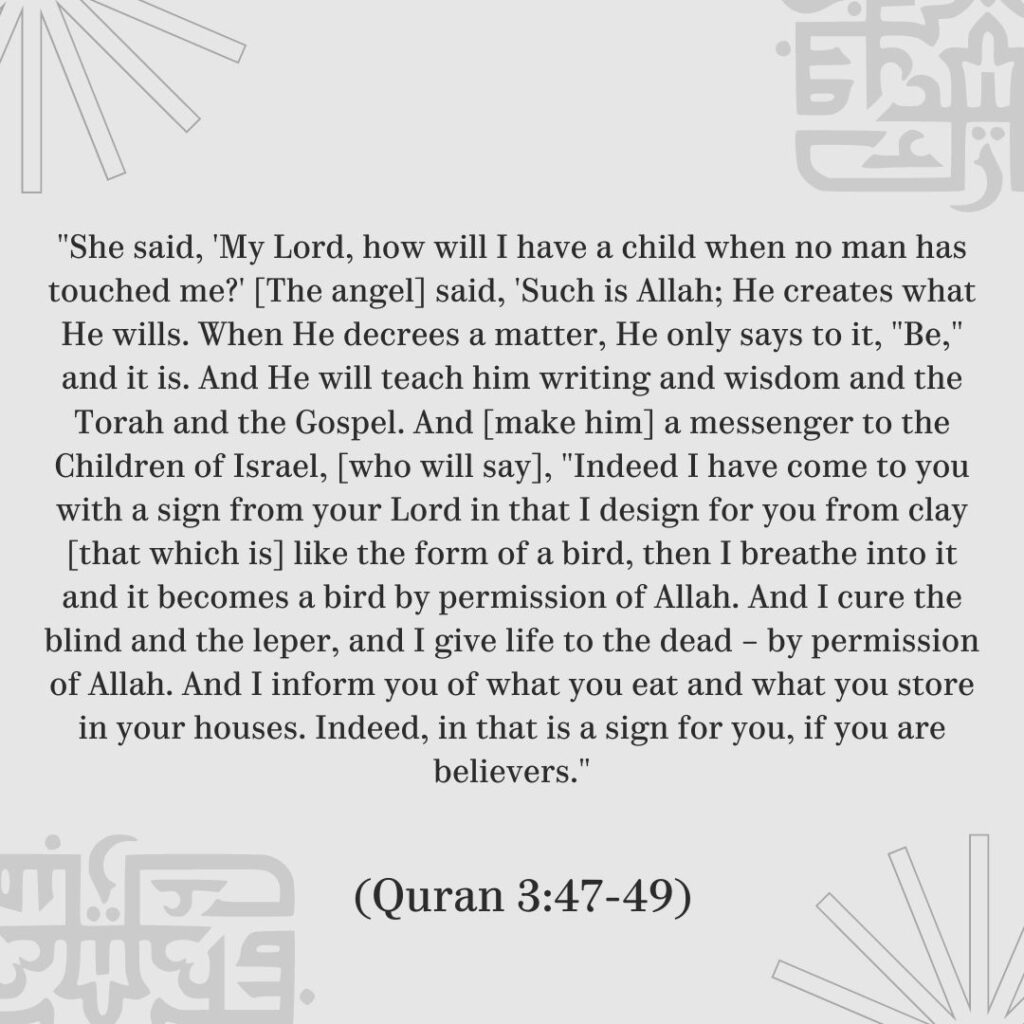Jesus (also known as Isa in Arabic) is one of the most revered and respected prophets in Islam. As a messenger of God, his teachings and life story are a significant part of Islamic belief and culture.
How do Muslims View Jesus?
In our last post, we talked about the Most Influential Muslim Kings with Their Achievements, and today, we will explore who Jesus is according to Muslims – his birth, life, death, and resurrection, as well as his mentions in the Quran and hadith.
1 – Who is Jesus according to Muslims?
Muslims believe that Jesus is a prophet of God, born to the Virgin Mary through the miraculous intervention of God. He was sent as a messenger to the children of Israel, to teach them about the oneness of God and to preach moral and ethical values. According to Islamic belief, he was a human being, and not divine or the son of God, as is commonly believed in Christianity.
In Islam, he is known as Hazrat Isa and the Messiah (al-Masih), and he is regarded as one of the most significant and beloved prophets, alongside other prophets like Adam, Noah, Abraham, Moses, and Muhammad.
The Quran refers to him as the Word of God and a Spirit from Him, which are interpreted to mean that he was created directly by God without a father, as well as possessing the Holy Spirit.
2 – Birth of Jesus
According to the Quran, the birth of Jesus was a miraculous event that occurred through the will of God. Mary, the mother of Jesus, was a chaste and pious woman who dedicated her life to worshipping God. She was visited by the Angel Gabriel, who informed her that she would give birth to a son.
Mary was surprised and asked how it was possible, given that she had not been touched by any man. The Angel Gabriel replied that it was by the will of God and that He could create whatever He willed.
Here are the most important Lessons for Muslims from the Story of Mary.
The Quran describes his birth as follows:

3 – Life and teachings of Jesus
Jesus began preaching to the people of Israel at a young age and called upon them to turn away from idolatry and to worship God alone. He was known for his wisdom, compassion, and miracles, including healing the sick and raising the dead. He also taught the importance of love, forgiveness, and mercy, which are core Islamic values.
One of the significant events in the life of Hazrat Isa, according to Islamic tradition is the incident of the table spread (Ma’idah). In this event, his disciples asked him to pray to God to send down a table spread of food from heaven, which they could share. He prayed, and God answered his prayer, sending down a table spread with a variety of foods. This event is mentioned in the Quran as follows:

4 – Death and Resurrection
Muslims believe that Jesus did not die on the cross, but rather, he was raised up to heaven by God before his crucifixion. This belief is based on the Quranic verse that says:

Islamic scholars have interpreted this verse to mean that while he was physically present at the crucifixion, he did not die on the cross. Rather, God raised him up to heaven before the crucifixion took place. Muslims believe that he will return to earth before the Day of Judgment to establish justice and peace on earth.
In Islamic belief, Hazrat Isa did not die on the cross but was raised up to heaven by God before his crucifixion. Therefore, there is no mention of a resurrection of Jesus in the Quran or authentic hadiths. However, there are some hadiths that mention him returning to earth before the Day of Judgment. One such hadith narrated by Abu Huraira states:

Another hadith narrated by Abu Huraira states:

These hadiths indicate that he will return to earth before the Day of Judgment and will establish a just and peaceful rule over the world. However, there is no mention of the resurrection of Jesus in Islamic belief.
5 – Miracles of Jesus
As a prophet of God, Jesus is believed to have performed many miracles, which are mentioned in both the Quran and Islamic tradition. One of the most well-known miracles attributed to him in Islamic belief is his ability to heal the sick and bring the dead back to life. In the Quran, it is stated that he healed the blind and the lepers and gave life to the dead with the permission of God. For example, in Surah Al-Imran, it is mentioned that Hazrat Isa said:

Another miracle attributed to him in Islamic tradition is his ability to speak as an infant in defense of his mother, Mary. According to a hadith narrated by Abdullah Ibn Abbas:

Jesus is also believed to have multiplied food and fed large crowds with very little food, similar to the miracle of the loaves and fishes in the Christian tradition. According to a hadith narrated by Anas ibn Malik:

6 – Importance of Jesus in Islamic History
The historical and theological significance of Jesus is notable in Islamic tradition. The individual in question is widely regarded as a preeminent divine messenger, ranking alongside Adam, Noah, Abraham, Moses, and Muhammad. Within the Quranic tradition, he is identified as the Messiah (Masih) and the Word of God (Kalimah).
The Islamic faith places significant value on his teachings, specifically his emphasis on love, compassion, and forgiveness. Muslims hold the belief that he propagated the identical message of monotheism and ethical principles that were imparted by all the divine messengers throughout the course of history.
Moreover, the nativity of Jesus holds a significant place in Islamic history, given that his birth to the Virgin Mary was made possible through divine intervention, thus rendering it a miraculous occurrence. The Quran provides a detailed account of the narrative of Mary and Jesus, and within Islamic history, Mary is esteemed as one of the most virtuous and devout women.
Moreover, the conviction regarding the second coming of Jesus Christ on the earth prior to the Day of Judgment holds great importance in the Islamic eschatological framework. According to Islamic belief, Jesus is expected to return as a fair and equitable leader who will institute harmony and righteousness throughout the world.
In Islamic history and theology, he is regarded with significant importance and reverence. The teachings and life narrative of this individual are fundamental components of Islamic teachings. His advocacy for love, empathy, and absolution continues to be pertinent and motivating for individuals of all religions and beliefs.
7 – Christmas in Islam
Muslims do not generally celebrate Christmas as a religious holiday because it holds specific significance for Christians. Christmas commemorates the birth of Jesus Christ, which is a central event in Christianity. Islam does not recognize Jesus as the Son of God or the Messiah, but rather as a prophet. Therefore, Christmas does not hold religious significance within Islam.
However, it is important to note that Muslims may still engage in various cultural or social activities related to Christmas, particularly in multicultural societies where Christmas is widely celebrated. Some Muslims may exchange gifts, participate in community events, or enjoy festive decorations. These activities are often seen as a way to promote social harmony and engage in interfaith dialogue. Nonetheless, it is important to respect individual beliefs and practices, as not all Muslims may participate in or endorse such activities.
Summing Up
In conclusion, Islam holds Jesus in the highest regard, as his teachings and the story of his life are deeply embedded in the religion and culture of the Muslim world. According to Islam, Hazrat Isa was a divine messenger sent to spread the message of the unity of God and the importance of living a moral and upright life.
Islamic belief differs from Christian belief in several key respects, including the fact that he was a human being rather than divine and did not die on the cross. Despite this, he is revered by Muslims as much as Christians, and his message of unconditional love, compassion, and forgiveness continues to uplift people of all faiths today.






